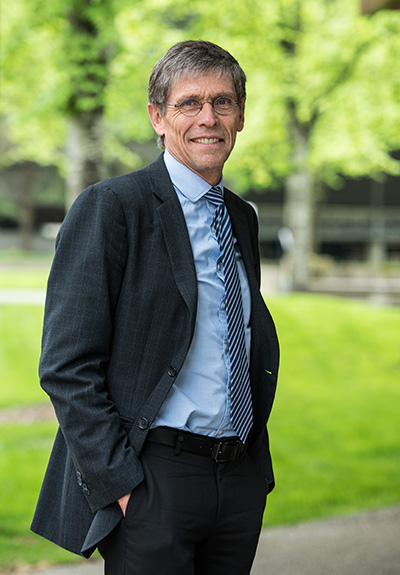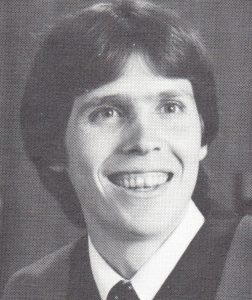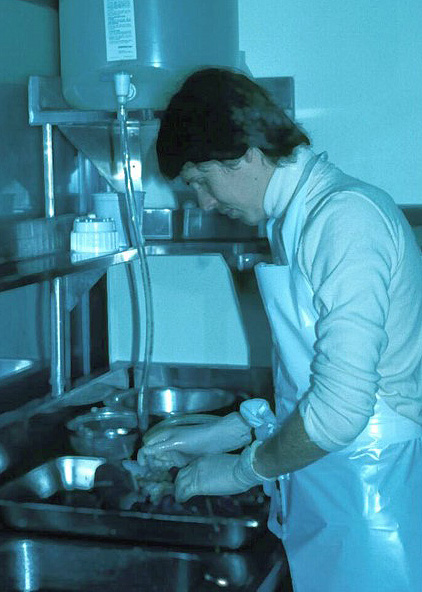Scroll down the list of presidents of the UBC Medical Alumni Association, and it reads like a “who’s who” of British Columbia’s physicians – many of them leaders of the Doctors of B.C. (formerly the B.C. Medical Association).
But the next name to be added to that list, starting May 5, represents a break from the past two decades.
Although he is a practicing pathologist, Mike Allard spends most of his time working for the medical school that trained him: He is Head of UBC’s Department of Pathology and Laboratory Medicine.
The last time the Medical Alumni Association (MAA) was led by a full-time faculty member was 20 years ago, when Orthopedics Professor Stephen Tredwell was president. The last department head to be an MAA president was Chuck Slonecker, in 1992.
That so few of the MAA’s 16 presidents have been faculty members is a bit curious, considering that the person most credited for the association’s creation was Professor David Hardwick, who, as it happens, also headed the Department of Pathology and Laboratory Medicine.
Dr. Allard’s new role as a bridge between the Faculty and the Faculty’s alumni wasn’t his idea. He wasn’t very involved with the MAA, and any thoughts of becoming a more active member were pushed aside by the demands of being a department head.
Besides, he hardly plays golf – the sport that provides the backdrop for the MAA’s major social event of the year.
But it was precisely his work as a department head that caught the attention of the MAA’s former president, Jack Burak.
Stepping up to the plate
As Deputy Registrar of the College of Physicians and Surgeons of B.C., Dr. Burak saw Dr. Allard in action when licensing or registration issues arose for residents or fellows in the Department of Pathology and Laboratory Medicine, many of them international medical graduates.
“I was very struck by the fact that Mike, despite being a very busy individual, would advocate for his residents and fellows,” Dr. Burak says. “There aren’t that many faculty members who would make the time and effort to do that.”
Dr. Burak also came to see Dr. Allard in action while serving on an accreditation subcommittee that Dr. Allard chaired.
“I was impressed by his leadership skills,” Dr. Burak says. “This was a high-powered committee made up of experts in various fields, but he was able to bring all of us together, he was fair-minded, he listened, he was focussed, and he skillfully guided us through the process.”
So when the hunt began for someone to lead UBC’s medical alumni for the next two years, Dr. Burak made his move. But it took some persuading.
“I put him off,” Dr. Allard says. “I couldn’t imagine taking on anything else. But he was pretty persuasive.”
“Maybe I caught him in a moment of weakness,” Dr. Burak says. “But that’s Mike – he steps up to the plate.”
From student to resident to researcher to administrator
After graduating at the top of his medical school class in 1981, Dr. Allard initially thought he might pursue internal medicine. But during his internship in Toronto, he turned to pathology, and returned to his hometown and his alma mater to pursue training in anatomic pathology.
Under the tutelage of the legendary James Hogg, Dr. Allard developed an interest in cardiovascular pathology and research, which led to a two-year fellowship in Birmingham, Alabama. His research program at UBC has been focused primarily on the way the heart adapts to pathological and physiological states, such as high blood pressure and exercise, with a particular interest in how and why fuel use by the heart is altered under these conditions, and how changes in fuel use might be beneficial in the aftermath of a heart attack.
Upon becoming a department head in 2009, his research has largely, but not completely, given way to administrative duties. But he keeps a hand in pathology (as a member of the heart biopsy service at St. Paul’s) and education (as an instructor to medical students and graduate students), and he is a peripatetic administrator, usually starting the day in one place and ending in another.
Looking back on his career, Dr. Allard thinks today’s medical students have it much tougher – at least when it comes to choosing a path.
“I bet the majority of our class didn’t really have firm plans when they graduated,” he says. “Many did locums, traveled, thought about what they wanted to do. Today, students need to decide about their future path in the third year of medical school. I can’t imagine having to do that.”
A focus on mentoring
That shift informs one of his priorities as the MAA’s newest president – to increase opportunities for alumni to share their professional and personal experiences and to mentor medical students and residents. He would also like to see versions of Vancouver’s Medical Student and Alumni Centre replicated in Kelowna and Prince George, the respective homes of the Southern Medical Program and the Northern Medical Program. The Island Medical Program, based in Victoria, opened its own gathering place in Royal Jubilee Hospital this year.
“The experience for medical students across the province is meant to be the same – not just in what and how they are learning, but also in the extracurricular activities that are such a formative part of going to medical school,” he says.
Dr. Allard hopes such efforts will enhance the visibility and importance of the MAA to students and learners, and may ultimately help arrest the association’s recent decline in membership, by encouraging among younger alumni – maybe even those he instructed – to join. He also wonders whether his own profile as a non-golfing Johnny-come-lately to the MAA might lead others like him – whether faculty members or community doctors – to get more involved.
While a newcomer to alumni activities, Dr. Allard is used to venturing down unfamiliar, unplanned paths, whether it’s becoming an academic administrator, during travels (he visited Cuba earlier this year), or taking up hockey at the age of 40. This latest venture, however, represents more than a search for novel experiences.
“I wanted to give back to the system that brought me along,” he says. “That’s why I became a department head – I wanted to do for others what Dr. Hardwick did for me. Now, as president of the MAA, I want to help build more of a community among people who graduated from this medical school.”


